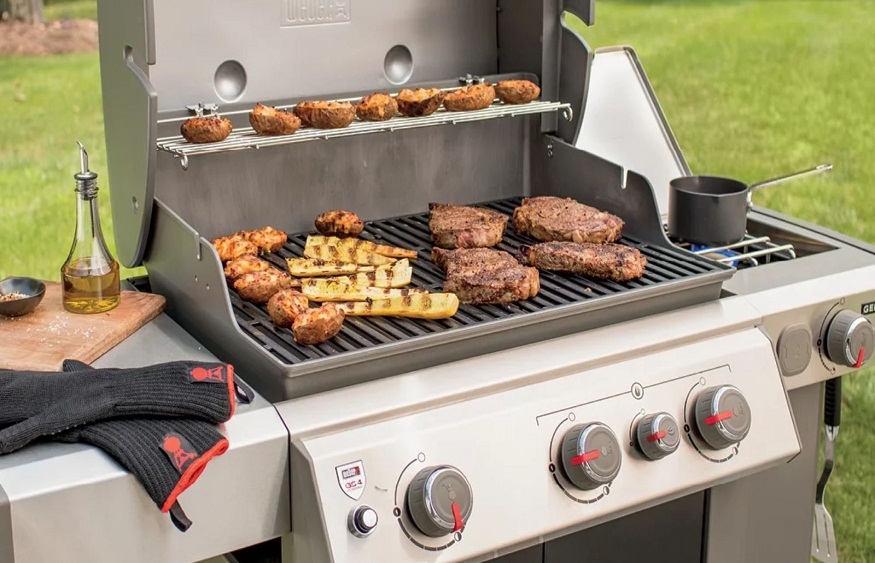
Barbecuing is more than just a method of cooking—it’s an experience, often associated with warm summer days, family gatherings, and the joy of outdoor cooking. Whether you’re a seasoned pitmaster or a casual weekend griller, choosing the right BBQ grill is essential for achieving that perfect char and smoky flavor. This guide dives deep into everything you need to know about BBQ grills, covering the various types, materials, features, and tips to make your grilling experience top-notch.
What is a BBQ Grill?
At its core, a BBQ grill is a device used to cook food over direct heat, typically outdoors. The heat source can vary, ranging from gas and charcoal to electricity or wood pellets, depending on the type of grill. Grilling involves cooking food quickly at high temperatures, creating a distinct flavor and texture that’s hard to replicate with other cooking methods. Many grills also allow for slow-cooking, smoking, or roasting, making them versatile cooking tools.
Types of BBQ Grills
Gas Grills
Gas grills are one of the most popular types of BBQ grills due to their convenience, ease of use, and ability to heat up quickly. These grills run on propane or natural gas, which is supplied through a tank or a direct line. The flame produced by the gas heats up a series of burners, which then cook the food.
Advantages of Gas Grills
- Convenience: Gas grills are incredibly easy to start, often with the push of a button or turn of a knob.
- Temperature Control: They offer precise control over cooking temperature, making it easier to cook delicate items like fish or vegetables.
- Quick Heat-Up Time: Gas grills heat up faster than charcoal grills, allowing you to start cooking within minutes.
Disadvantages of Gas Grills
- Flavor: Some grilling enthusiasts argue that gas grills don’t provide the same smoky flavor as charcoal or pellet grills.
- Cost: Gas grills tend to be more expensive than their charcoal counterparts.
- Portability: While there are portable gas grill options, full-sized gas grills are often bulky and heavy, making them less suitable for taking on camping trips or tailgating events.
Charcoal Grills
Charcoal grills are the go-to choice for purists who believe in the traditional grilling experience. These grills use charcoal as their fuel source, often in the form of briquettes or lump charcoal, which burn at high temperatures to cook food.
Advantages of Charcoal Grills
- Flavor: Charcoal grills give food that classic smoky BBQ flavor that many grill enthusiasts love.
- Affordability: Charcoal grills are generally more affordable than gas grills, making them an attractive option for budget-conscious buyers.
- Temperature Range: Charcoal grills can reach very high temperatures, making them ideal for searing steaks and other meats.
Disadvantages of Charcoal Grills
- Longer Set-Up Time: It can take 15-30 minutes to get the charcoal fully ignited and the grill ready for cooking.
- Temperature Control: Controlling the temperature on a charcoal grill is more challenging, as it depends on the arrangement of coals and airflow.
- Clean-Up: Charcoal grills require more maintenance, as you’ll need to dispose of ashes after each use.
Pellet Grills
Pellet grills are a relatively new addition to the BBQ scene, combining the best features of gas and charcoal grills. These grills use compressed wood pellets as their fuel source, which are automatically fed into a firepot to create heat and smoke.
Advantages of Pellet Grills
- Flavor: The wood pellets give food a delicious smoky flavor, which can be customized depending on the type of wood pellets you use (e.g., hickory, mesquite, apple).
- Versatility: Pellet grills are extremely versatile, allowing you to grill, smoke, bake, roast, braise, and BBQ with one device.
- Ease of Use: Many pellet grills come with digital controls and automatic temperature regulation, making them easy to operate.
Disadvantages of Pellet Grills
- Cost: Pellet grills tend to be more expensive than both gas and charcoal grills.
- Electricity Requirement: Most pellet grills need electricity to operate the auger and digital control system, making them less portable for off-grid locations.
- Pellet Availability: You’ll need to have a steady supply of wood pellets, which may not be as readily available as propane or charcoal.
Electric Grills
Electric grills are an excellent option for people who live in apartments or places where open flames are restricted. These grills rely on electricity to heat up and cook food, making them one of the most convenient types of BBQ grills available.
Advantages of Electric Grills
- Ease of Use: Electric grills are incredibly easy to use, requiring only a plug-in to start cooking.
- Indoor and Outdoor Use: Electric grills can often be used indoors, making them perfect for people who don’t have outdoor space.
- No Fuel Needed: There’s no need for propane, charcoal, or wood pellets—just plug in the grill and start cooking.
Disadvantages of Electric Grills
- Flavor: Electric grills lack the smoky flavor that you get from wood, charcoal, or gas grills.
- Heat Output: Electric grills generally don’t reach the same high temperatures as gas or charcoal grills, which may limit their ability to sear food properly.
- Limited Size: Electric grills tend to be smaller, making them better suited for small families or individuals.
Portable Grills
Portable BBQ grills come in all shapes and sizes, from small charcoal grills to compact gas grills. These grills are designed for people who love to grill on the go, whether it’s for camping, tailgating, or picnics.
Advantages of Portable Grills
- Portability: These grills are lightweight and easy to transport, making them perfect for outdoor adventures.
- Variety: Portable grills come in both gas and charcoal models, giving you the flexibility to choose your preferred fuel type.
- Affordability: Portable grills tend to be more affordable than full-sized models, making them a great choice for budget-conscious grillers.
Disadvantages of Portable Grills
- Limited Cooking Space: Portable grills often have smaller cooking areas, limiting the amount of food you can cook at once.
- Lower Heat Output: Some portable grills may not generate as much heat as their larger counterparts, which could affect cooking times.
Key Features to Look For in BBQ Grills
When shopping for a BBQ grill, it’s essential to consider several factors to ensure you get the right model for your needs. Here are some of the key features to look out for:
Grill Size
The size of the grill is one of the most important factors to consider. Do you often host large gatherings, or are you grilling for just one or two people? Full-sized grills can accommodate more food at once, while smaller, portable models are perfect for casual or on-the-go grilling.
Temperature Control
Precise temperature control is crucial for cooking different types of food. Many gas and pellet grills come with adjustable knobs or digital controls that allow you to regulate the temperature easily. On charcoal grills, you control the temperature by adjusting the airflow vents and the amount of charcoal used.
Grill Material
Grills are typically made from various materials, each with its pros and cons:
- Stainless Steel: Durable, rust-resistant, and retains heat well.
- Cast Iron: Excellent for heat retention and searing but can rust if not properly maintained.
- Porcelain-Coated Grates: Prevents food from sticking and is easier to clean.
Fuel Efficiency
Consider how much fuel the grill consumes. Gas and pellet grills tend to be more fuel-efficient than charcoal grills. Gas grills can use natural gas, which is more economical than propane, while pellet grills offer efficiency through controlled fuel feeding.
Safety Features
Safety should always be a priority when choosing a BBQ grill. Look for features like:
- Sturdy Construction: Ensure that the grill is stable and won’t tip over easily.
- Heat Shields: Prevents flare-ups from fat dripping onto the burners.
- Ignition System: Look for reliable ignition systems to avoid accidents while lighting the grill.
BBQ Grill Accessories
Investing in quality BBQ grill accessories can elevate your grilling experience and make it more enjoyable and efficient.
Tools for Grilling
Here are some essential tools to have on hand:
- Tongs and Spatula: Long-handled tools are a must for flipping meat and vegetables without getting too close to the heat.
- Grill Brush: A sturdy brush is necessary for cleaning the grates after each use.
- Meat Thermometer: Ensures your food is cooked to the proper internal temperature.
- Grill Baskets: Perfect for grilling small or delicate foods like vegetables or fish.
Cleaning Accessories
Keeping your grill clean is essential for both safety and performance. In addition to a grill brush, consider investing in:
- Drip Pan Liners: These make cleaning up grease and drippings a breeze.
- Ash Cleaners: For charcoal grills, a good ash cleaning tool will make disposal easier.
Covers and Shelters
Protect your grill from the elements with a grill cover. These covers prevent rust and wear caused by rain, snow, and sun exposure. If you don’t have a covered patio, consider investing in a grill shelter to keep your grill protected year-round.
BBQ Grilling Tips for Beginners
If you’re new to grilling, there are some key tips to keep in mind to ensure your food comes out perfectly every time.
Preparing Your Grill
Before you start cooking, always preheat your grill. This helps burn off any residue from previous uses and ensures even cooking. For charcoal grills, let the coals ash over before placing your food on the grate.
Choosing the Right Fuel
The type of fuel you use will significantly impact the flavor and cooking style. Charcoal and wood pellets impart a smoky flavor, while gas is more neutral. Experiment with different wood types in pellet grills, such as hickory or applewood, to add unique flavors to your food.
Managing Heat Zones
Create both direct and indirect heat zones on your grill. Direct heat is perfect for searing and cooking burgers or steaks, while indirect heat is ideal for slow-cooking larger cuts like ribs or whole chickens. This gives you more control over how quickly or slowly your food cooks.
Cleaning and Maintenance
Clean your grill grates after each use to prevent the build-up of grease and food residue, which can cause flare-ups and affect the taste of your food. For gas grills, check the burner tubes regularly to ensure they’re not clogged.
BBQ Grilling Techniques
Mastering various grilling techniques can take your BBQ skills to the next level.
Direct vs. Indirect Heat
Direct heat refers to cooking food directly over the flame or heat source, while indirect heat involves cooking food adjacent to the heat source. Use direct heat for quick-cooking foods like burgers, while indirect heat is better for larger cuts that require slower cooking times.
Searing
Searing involves cooking food at a high temperature to create a caramelized, browned crust on the outside. This technique is perfect for steaks, chicken, and other meats, as it locks in juices and enhances flavor.
Smoking
Smoking is a slow-cooking method that involves cooking food at a low temperature while exposing it to wood smoke. Pellet grills are perfect for smoking, but you can also smoke food on a charcoal or gas grill using a smoker box or wood chips.
BBQ Safety Tips
Grilling is fun, but safety should always be a priority. Here are some essential safety tips to keep in mind:
- Keep the Grill Clean: A dirty grill is a fire hazard. Always clean your grill after each use, especially the grease trap and grates.
- Check for Gas Leaks: If you’re using a gas grill, regularly inspect the propane tank and hoses for leaks. You can check for leaks by applying a soapy water solution to the connections—if bubbles form, you have a leak.
- Never Leave the Grill Unattended: Always keep an eye on your grill when it’s in use, and never leave it unattended, especially around children and pets.
- Grill in a Safe Location: Ensure your grill is set up in an open, well-ventilated area away from your home, deck railings, or overhanging branches.
- Use Proper Tools: Use long-handled tools to avoid burns and keep a fire extinguisher or bucket of water nearby in case of flare-ups.
Conclusion
Choosing the right BBQ grill and mastering key grilling techniques can transform your outdoor cooking experience. From gas and charcoal grills to pellet and electric options, there’s a perfect grill for every type of BBQ enthusiast. With the right tools, accessories, and safety measures, you can enjoy delicious, smoky flavors all year round. Happy grilling!


